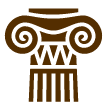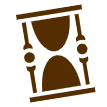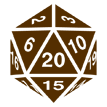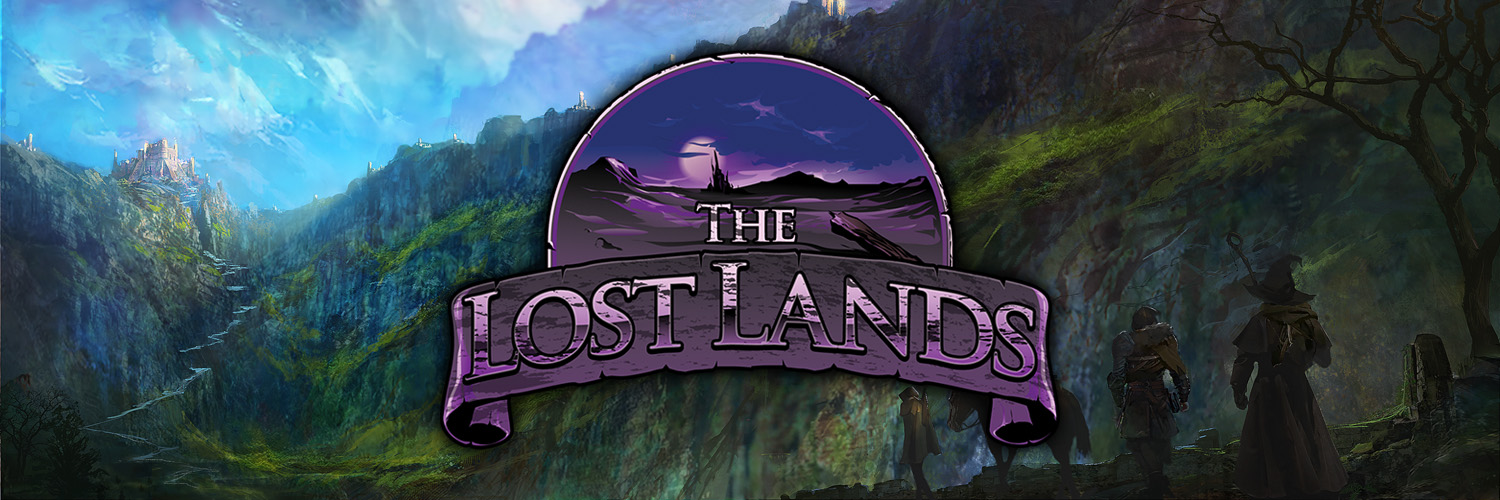Carterscroft
Carterscroft is a large walled city at the intersection of three main high-roads. A fourth major road, the Tantivy, leads from the city gates to the northeast, but it is an ordinary packed-dirt thoroughfare, not one of the stone-paved Hyperborean roads. The city towers fly the banner of Eastreach, a black flag showing a scroll and four coins below a purple crown.
The city of Carterscroft is the capital of Eastreach. This is the headquarters of the provincial government’s corruption, engineered by the merchants of the city of Bard’s Gate for their own safe passage through the region.
History and People
Carterscroft emerged as a large trading town in the days of Hyperborea, a staging ground for traders and armies preparing to make the long journey between the core of the empire to the distant lands of the Isthmus of Irkaina, and even to distant Libynos beyond. The city is named for the massive fenced crofts that have always been set aside to form and organize caravans that often number a hundred or more travelers.
Government
A mayor elected by the city’s landowners governs the city of Carterscroft. While it is unusual for a Foerdewaith Provincial Capital to be self-governed, the law dates back to the original invasion of Eastreach by the Kingdoms of Foere. When the ragged but energetic invasion of Eastreach began in 2765 I.R., the mayor of Carterscroft impounded all caravan cargoes inside the city walls to provide a large emergency store of food to withstand a siege. By the time the vanguard of the Foerdewaith invaders arrived at the city walls, they found a well-defended and well-provisioned stronghold facing them. For a while, the Foerdewaith barons and their forces contented themselves with seizing the lands around the city, but without a large army to invest the city, food supplies continued to be smuggled in, and it became clear that any siege would be prolonged and costly. Eventually, some of the more influential Foerdewaith nobles struck a deal with the city: In exchange for surrendering, Carterscroft would remain self-governed by its own citizenry, and only small numbers of Foerdewaith soldiers would be allowed in the city walls at any given time. The second part of the agreement was mutually forgotten once the province’s lord-governor was installed in Carterscroft; even the worst of the invading barons would hardly pillage the lord-governor’s own capital city. The first part of the agreement, entitling the city to elect its own mayor, has remained in place.
Any offense committed in the city walls, even treachery to the crown, is tried by the city’s urban courts. The lord-governor also has a Court of Justice in the city that adjudges all crimes and offenses committed outside Carterscroft from anywhere in the province. Because the lord-governor’s Court of Justice is the highest in the land, it is actually considerably busier than the urban courts.
The Province of Eastreach is filled to bursting with tiny baronies owing their allegiance directly to the overking instead of to a higher noble, due to the expansive “take-it-and-you-rule-it” provisions of the Eastreach Decree. Such barons are entitled to bring their grievances and squabbles directly to the lord-governor for resolution. If the lord-governor attempted to address all these petty issues directly, it would utterly paralyze the government of the province, burying it in local disputes. Fortunately, the tool of bribery is available to the government, and offers a quick and convenient way to resolve otherwise-thorny legal questions.
The urban and the provincial court systems are eminently bribable, so wealthy individuals are unlikely to face any sort of energetic prosecution as long as enough silver crosses the right palms. This has drawn the ire of the priesthood of Thyr, as further described below.
Carterscroft is the seat of the high sheriff of internal revenue, a lucrative posting appointed by the lord-governor to oversee payments from the merchants of Bard’s Gate for safe passage through the province. A significant portion of this money flows into the hands of the lord-governor and the high sheriff, who take advantage of their short terms in office to amass personal fortunes before returning to Foere. The current high sheriff is Sir Croaten Gui (pronounced “gwee”), a pleasant man who has hanged more than a hundred peasants for failure to pay taxes.
Religion
Most of rural Eastreach Province worships the Hyperborean gods and goddesses rather than the divine patrons of invading Foere, or the fashionably newfangled deities whose worship is spreading from Bard’s Gate. There is a developing split between the faiths of the peasantry and the patron gods revered by the nobility and merchants, and this split is reflected clearly here in the capital city. Archeillus, a god of nobility imported by the Foerdewaith invaders, has gained considerable traction among the nobility, and the worship of Sefagreth has begun to supplant the worship of Tykee among the merchants. The peasantry continues to worship Kamien, Freya, Solanus, and Telophus.
As a large city, Carterscroft is home to all sorts of small temples and shrines, including all of the above and others, but the predominant faiths are those of Archeillus, Tykee, and Sefagreth.
In recent years, the high priest of Thyr in Carterscroft has begun an active campaign to fight bribery and favoritism in the courts, issuing stern sermons and dire warnings. The government and wealthy citizens of the city have fought back actively against the high priest’s campaign, cutting back or eliminating their donations to the temple, and even levying special taxes on Thyr’s festival-days.
Institutions
The High Sheriff: Carterscroft is the seat of the High Sheriff of Internal Revenue, a lucrative posting appointed by the Lord-Governor to oversee payments from the merchants of Bard's Gate for safe passage through the Province. A significant portion of this money flows into the hands of the Lord-Governor and the High Sheriff, who take advantage of their short terms in office to amass personal fortunes before returning to Foere. The current High Sheriff is Sir Croaten Gui (prounounced “gwee”), a pleasant man who has hanged more than a hundred peasants for failure to pay taxes.
The Temple of Thyr
The temple has run into very hard times, even before High Priest Dalenus Whitebeard started his tirades against corruption in the city and oppression in the countryside. Unlike the rural peasantry, the city of Carterscroft and the noble classes are drifting away from the traditional Hyperborean gods such as Thyr, and turning toward newer, more fashionable deities such as Archeillus and Sefagreth.The Temple of Archeillus
The worship of Archeillus, God of Rightful Rule and Protector of the Nobility, came to Eastreach along with the Foerdewaith invaders in 2765, never having been much worshipped outside central Foere. He is a god of legitimate rulership and bloodlines, especially worshipped by smaller lords, and defends the rights of the nobility to the letter of the law. At the outset of the Foerdewaith invasion of Eastreach, many of the Foerdewaith barons intending to seize lands in Eastreach consulted the priesthood of Archeillus. The question was whether their intention to seize Eastreach land under the Overking’s decree was an unlawful overthrow of the Province’s existing leadership, or the beneficial creation of a system of nobility in a chaotic land. After consulting the oracles and omens, the High Priest of Archeillus announced that the Overking’s seizure of Eastreach was a valid extension of royal authority over an unruled land, and that as long as the invaders followed the Overking’s instructions to the letter, they were authorized to dispossess the existing ruling class of Eastreach. Exalted by this divine support for their cause, many of the invading barons brought priests of Archeillus along with them on the assault to serve as counselors and chaplains. Once the bloodbath in Eastreach ended, these priests of Archeillus were instrumental in drawing boundaries for the tangled patchwork of feudal rights in Eastreach, and ensuring that every petty noble received the greatest possible license for their tiny fiefdoms and estates under the Eastreach Decree. By doing so, they protected the rights of the lesser nobles, but played a large role in making Eastreach ungovernable by a centralized authority. This is a matter of no concern to the priesthood: Archeillus’s inherent lawfulness is that of lineages, feudal rights, and continuity, not the compromises and generalities involved in the governance of nations. To the extent a country intrudes on the feudal rights of the petty nobility for any reason, the country is in the wrong — at least in the liturgy practiced among the lower gentry. This theology is the sword and shield of the petty nobles of Eastreach, hungry to gather a share of the trade money flowing through the Province. The High Priest of Archeillus in Carterscroft is the tall, silver-haired Baron-Priest Oluard Mandrioc, a haughty and extremely aristocratic individual as one might expect. Oluard is not a cruel man, nor does he advocate tyrannical behavior by the nobles he advises; but he does not stand against tyranny either, so long as the authority behind it is valid. Many of his priests take a harder line against the peasantry, supporting harsh measures as a means of preventing rebellion or unrest. This priestly faction has gained a growing audience among petty nobles with cruel temperaments but impeccable family trees. Archeilleus is very popular among “robber barons” who charge taxes for everyone crossing their small borders, and who oppress their peasants to squeeze more money out of them. The situation is made somewhat worse by an insignificant person in the Temple of Archeillus, a scribe by the name of Quillman Clark. Quillman is secretly an adherent of Fraz-Urb’luu, Demon-Prince of Deception. Quillman is responsible for making the final copies of letters sent from the temple to various petty barons, and he makes minor alterations. A letter telling a baron that he can take “only whatever taxes are legal” from his peasants might be changed, for example, to permit taking “whatever taxes are possible.” With small changes to letters, the scribe is subtly changing the whole tenor of the temple’s advice to the rural barons, a significant effect for such a minor, unassuming person.Temples of Sefagreth and Tykee
The two predominant merchants’ gods in Carterscroft, Sefagreth is a god of trade, and Tykee is a goddess of luck. Although Carterscroft is more of a stopping-point for the significant commerce traveling from Bard's Gate to Eastgate, many caravan-drivers and merchants in Carterscroft venerate these two deities enough to bring them up to a very prominent status in the city. Their temples are large, if not lavish, and the political influence of the temple of Sefagreth is measurable. The priesthood of Tykee does not play politics, but seems to do just fine without particular effort. Capital
Carterscroft, City of (Capital)
Type
Capital
Owning Organization











Comments